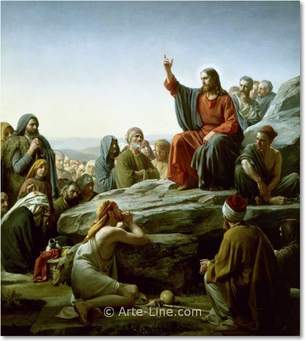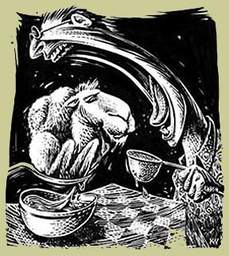Author’s Note: This week finds me in Peru beginning a mission trip with my church in one of the most impoverished area near Lima. The following devotional thought is an excerpt from my third book, God’s Mirror Image: 15 Ways You Can Live A Christ-Like Life.”
Background Passages: Genesis 1:27; John 14:9; Matthew 5:1-12
I pored through a number of old 35mm slides, pictures taken by my parents when my siblings and I were small. I enjoyed sharing those captured memories with my children and grandchildren. Fascination grew as we recognized family resemblances across generations…the power of genetics, I suppose. If I heard it once, I heard it several times, “I see your Dad in his eyes.” “You look so much like your uncle at that age.” “She is the spitting image of your mother.”
There is some measure of joy in knowing that we physically resemble those most dear to us. Then, I wonder, when others look at us, do they see how closely we resemble Christ in spirit and deed? Can the world see Jesus…see God…in us?
“So God created man in his own image,
in the image of God he created him;
male and female he created them.”
On the surface, being created in the image of God seems such a complex theological concept requiring a deeper understanding of the nature and spirit of the Creator himself. But, it’s really not that hard. Jesus told his disciples, “If you have seen me, you have seen the Father.” In other words, we find in the character of Jesus Christ, the very nature and spirit of God. The image of God reflected in the life of Christ. To be the image of God in our world, as we were created to be, simply requires us to be like Jesus.
So, how are we to know what that looks like?
Every gospel story reveals the character of Christ. We can identify in Jesus God’s compassion, love, faith, humility and honesty. We find in his teachings keys to living as the image of God.
People flocked to Jesus early in his ministry in Galilee, drawn by the candor and consistency of his teaching and the power of his healing. As he left Capernaum one day, the crowd pressed around him to hear his words and feel his touch. Eventually, somewhere on the northeastern shore of the Sea of Galilee, he sat himself down on a rocky hillside and began to teach. Matthew records this event as the Sermon on the Mount.
Rather than being a single event, the Sermon on the Mount may be a collection of ideas that Jesus taught over and over again throughout his ministry captured by Matthew as a summary of his teaching themes. William Barclay, in his commentaries, suggests as much.
One of the most beloved segments of this passage is known as The Beatitudes, a passage that unveils the character demanded of those who desire to be a part of the kingdom of God. When you look at the passage and look at the life of Christ, you’ll find that Jesus modeled each characteristic in his daily walk.
Blessed are the poor in spirit, for theirs is the kingdom of God.
Blessed are those who mourn, for they will be comforted.
Blessed are the meek, for they will inherit the earth.
Blessed are those who hunger and thirst after righteousness,
for they will be filled.
Blessed are the merciful, for they shall be shown mercy.
Blessed are the pure in heart, for they will see God.
Blessed are the peacemakers, for they will be called the sons of God.
Blessed are those who are persecuted because of righteousness,
for theirs is the kingdom of heaven.
Jesus teaches about kingdom living. Think of them as proverbs or declarations. Assuring us that we will feel blessed as a result of our actions or attitudes that align with the expectations of the Father. That demonstrating these character traits leads to promised rewards.
Consider the word “blessed.” Some translations substitute the word “happy” rather than “blessed.” But, “happy” feels too frivolous. Too superficial. Think, rather, in terms of the contentment, joy and peace that comes from being in right relationship with God. It cannot be dampened by external circumstances.
Happiness may be a part of the equation, but take it deeper into the heart of our relationship with the Father. One commentary called being blessed “a pledge of divine reward for the inner spiritual character of the righteous.” I like that. Jesus promises that if we live in such a way as to reflect the character of Christ, we will be filled with inner peace and joy.
Focus on the specific character demanded of those who would be a part of the kingdom of God and the promise that follows. Blessed are…
…the poor in spirit.
To be poor in a financial sense is to be destitute. To be poor in a physical sense is to be oppressed. To be poor in the spirit is to be humbled, to live without arrogance or self-sufficiency. It speaks to the person who recognizes his or her sinful nature; who comes to God each day with a contrite heart; knowing that God’s grace is an unmerited gift that promises a life within the kingdom of God.
…those who mourn.
Everyone in this life will experience sadness and grief. Such mourning is a natural part of the ebb and flow of life. Here, Jesus speaks of those who mourn for a lost world; for the sinfulness that serves as a barrier separating us from God…from the relationship he desired with us when he created us. If we don’t grieve for the lost we will never feel compelled to share the love of Christ with a ruined world. God will provide comfort for those whose hearts break when confronted by sin and disbelief. Comfort which allows us to continue the hard work of reconciling a lost world to the one who loves them so much.
…the meek.
Think of meekness not as passivity or weakness. That is the world’s definition. Its first century meaning carries an idea of self-control…gentleness…kindness…all fruits of the spirit identified by Paul. The meek control their instincts and impulses, harnessing the passion and power within them to build and edify, to lift up rather than tear down. They see all things through the eyes of empathy, hearts free of evil intent and purpose. These are people who treat everyone with respect and dignity regardless of their station in life.
…those who hunger and thirst after righteousness.
Hunger and thirst represent our most primal needs. When truly hungry and thirsty, a body will do almost anything to secure food or drink. Little else seems to matter. To hunger and thirst for righteousness is to demonstrate that strongest spiritual desire to understand and act upon the will of God. Our passion to live for him takes precedence over anything else. Therein lies the promise. The one who seeks after God will have those needs satisfied. His or her life filled with the joy of knowing who walks beside you.
…the merciful.
Mercy is an act of grace. Despite our sinful ways, God offers his forgiveness, requiring only a contrite heart. It is pure, unmerited grace. Mercy is not a quality limited to God alone. As believers in Christ discover his forgiveness, mercy toward others ought to be a natural outgrowth of our hearts. People hurt us. Ignore us. Sin against us. Hate us. Persecute us. We face a choice: retaliate or redeem. Mercy finds expression in the kindness and compassion we extend even to those who hurt us. It is a quality borne out of the mercy God extended toward us even when we hurt him. As we forgive, so are we forgiven. That is the promise of God.
…the pure in heart.
When the Bible speaks of the heart, it speaks to the center of will, the choices we make. Pure in heart means the decisions we make, the desires we hold, the intent of our thoughts and deeds must be unblemished with sin, wholly pleasing to God. The purity of our hearts lies at the center of every characteristic proclaimed in the beatitudes…our mercy, our quest for righteousness, our meekness and humility. Jesus told Nicodemus, “You must be born again” to suggest a spiritual change in his heart. To take that which was unclean and purify it from all self-interests and desires.
Jesus promises those who would listen that the pure in heart would see God. There is certainly within this statement a promise of our life eternal in the presence of the father. It might also suggest that the pure in heart have within them the capacity to see God in every circumstance…seeing his presence in life’s heartbreaks and horrors as well as its blessings and bounty.
…the peacemakers.
The kingdom of God is a kingdom of peace and yet we are too often at war with one another. The broken relationships, the societal divisions, the political acrimony, the racial bigotry drive a wedge between God’s people. Joy comes to those who find ways of bringing people together in the love of Christ, reconciling others to God and to one another. This statement promises the peacemakers will be called “Sons of God.” The Old Testament called angels the Sons of God. Angel may be an apt description of those who act as God’s peacemakers.
…the persecuted.
Living a lifestyle exemplified by the characteristics listed in the beatitudes puts one in a precarious place. The life God demands of his children is a life the world opposes and rejects. All who identify with Christ face a hostile world that tolerates in the best of times and terrorizes in its worst. God offers a promise to those who face such opposition. Hold on. Run the race. Keep the faith. God’s kingdom is yours forever.
I go back to the beginning. We are to live as the image of God. That’s how he created us. We discover how to do that by looking at the life of Christ and paying attention to his teachings. Throughout his ministry Jesus taught us how to live and modeled those choices every day of his life. He lived and breathed every action and attitude he taught in the beatitudes. If we are to live like him, as the image of God, we ought to do the same.
The promise of the beatitudes is not a pie-in-the-sky, wait for it, kind of promise. Barclay writes, “…the beatitudes are not pious hopes of what shall be; they are not glowing but nebulous prophecies of some future bliss; they are congratulations on what is…It is a blessedness (a joy and peace) which exists here and now.”
Live it and claim the promise.
*****
Author’s Note: You can pick up a copy of God’s Mirror Image at the Barnes and Noble Bookstore in Pasadena, Texas, or you can order it online from Amazon.com or any online bookstore. My other books are Put Away Childish Things and The Chase. All are available from Amazon.com or any online bookstore. If none of those options work for you, contact me at kirkallanlewis@yahoo.com. Thanks to all who take the time to read my books and my blog. It’s my prayer that God speaks through each word to each of you.


